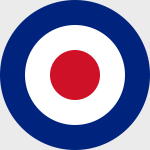Corgi AA37202 RAF Handley Page Halifax B Mk. III Heavy Bomber - No.578 Squadron, Burn, England, March 1944 (1:72 Scale)
"Why should we have a navy at all? There are no enemies for it to fight except apparently the Army Air Force."
- General Carl Spaatz, Commander of the US 8th Army Air Force, after WWII
 The Handley Page Halifax was one of the British front-line, four-engine heavy bombers of the Royal Air Force during the Second World War. A contemporary of the famous Avro Lancaster, the Halifax remained in service until the end of the war, performing a variety of duties in addition to bombing. The Halifax was also operated by squadrons of the Royal Australian Air Force, Royal Canadian Air Force, Royal New Zealand Air Force and Polish Air Force.
The Handley Page Halifax was one of the British front-line, four-engine heavy bombers of the Royal Air Force during the Second World War. A contemporary of the famous Avro Lancaster, the Halifax remained in service until the end of the war, performing a variety of duties in addition to bombing. The Halifax was also operated by squadrons of the Royal Australian Air Force, Royal Canadian Air Force, Royal New Zealand Air Force and Polish Air Force.
The Halifax entered service with No.35 Squadron RAF at RAF Linton on Ouse in November 1940 and its first operational raid was against Le Havre on the night of March 11th-12th, 1941. In service with RAF Bomber Command, Halifaxes flew 82,773 operations, dropped 224,207 tons of bombs and lost 1,833 aircraft. (Wings Encyclopedia of Aviation, Orbis, 1979) In addition to bombing missions, the Halifax served as a glider tug, electronic warfare aircraft for No.100 Group RAF and special operations such as parachuting agents and arms into occupied Europe. Halifaxes were also operated by RAF Coastal Command for anti submarine warfare, reconnaissance and meteorological roles.
Total Halifax production was 6,176 with the last aircraft delivered in November 1946. In addition to Handley Page, Halifaxes were built by English Electric, Fairey Aviation, Rootes Motors and the London Aircraft Production Group. Peak production resulted in one Halifax being completed every hour.
Post-WWII, Halifaxes remained in service with the RAF Coastal Command and RAF Transport Command and the
Armee de l'Air until early 1952. The Pakistan Air Force which inherited the planes from the RAF continued to use the type until 1961. A transport/cargo version of the Halifax was also produced, the Handley Page Halton.
Pictured here is a 1:72 scale replica of a Handley Page Halifax B Mk. III heavy bomber that was attached to No.578 Squadron, based at Burn, England, in March 1944.
Dimensions:
Wingspan: 17-1/4-inches
Length: 12-inches
Release Date: November 2007
Historical Account: "A Cross to Bear" - Cyril Joe Barton was an English recipient of the Victoria Cross, the highest and most prestigious award for gallantry in the face of the enemy that can be awarded to British and Commonwealth forces. He was 22 years old, and a P/O in the 578 Squadron, Royal Air Force Volunteer Reserve during the Second World War when the following deed took place for which he was awarded the VC. On March 30th, 1944, in an attack on Nuremberg, Germany,and while 70 miles from the target, Pilot Officer Barton's Halifax bomber was badly damaged by enemy aircraft.
A misinterpreted signal resulted in three of the crew bailing out and Pilot Officer Barton was left with no navigator, air bomber or wireless operator. He pressed on with the attack, however, releasing the bombs himself.


